10 Steps Toward Becoming an Imperfectionist
Dispatch #30: Returning to the lessons of the mysterious
Hi friend,
Everything is fragile. And yet resilience is built into the smallest bud. Everything is fragile. And yet the house fly’s wing, pausing on my windowsill, withstands a heavy rain. Everything is fragile. And yet I read these words on my tiny screen: I’m thinking about the Palestinian woman who comforted a boy who lost his mother by saying, “We are all your mothers.”
Everything is fragile, precarious, shifting, changing, unwieldy. And yet I still sit down to meditate once a day. What do I find? I think this blacked-out screenshot from Gilmore Girls says it best:
Netlfix gets mad when you try to “capture” “their” “content” & so, it makes the image black. Yet there is something even more accurate about having these words dangle in black space - the Lorelei-less-ness of it all, the Rory-less-ness, the voiding of everything, the void itself. Even trying to screenshot a funny scene from a comforting show becomes an existential work of art. I’m here for that.
It’s true, my brain is a wild jungle full of scary gibberish. So why do I keep meditating? Why would I want to sit in the middle of that rabid jungle? I ask myself this every day, sitting down on my couch to meditate for twenty minutes, exhausted & not quite encouraged. There is something paradoxical & existential about continuing down a faithful path while using questions about that very path as my machetes. Why am I even doing this? Hack, hack, hack! (Yes, the double meaning of the word feels apt.) Where is that promised peace? Hack, hack, hack! All I see is a wild jungle full of scary gibberish! Where is safety? Where is security? Hack, hack, hack! I’m not always sure of the benefits of sitting, of courting stillness. It’s not often immediately obvious. So as I daily hack, hack, hack, I have to remind myself of the key reasons.
I say reasons, but there is really only one reason at the heart of my practices (whether meditative or creative or interpersonal). My reason is intimacy. I sit in meditation to become intimate with the jungle. With its birds. Its downpours. Its venom. Its chaos. And I sit with my poems & my novel for much the same reason; to become intimate with language itself, with creativity, & (how exciting!) with The Void TM out of which all creation emerges. At my best, I sit with others to sit with others; not to categorize or judge or wall off or cage in. But because we are here on this planet to know & be known, feel & be felt, touch & be touched. In other words, we are here to be intimate.
Above all, I want intimacy with mystery. I want to press my nose up against the mystery of being here, of being alive at all, of being a synaptic, dynamic, complex, needy, stunning, & stunned human being. This can be awe-inspiring. But often times it’s dull, dreary, maddening, or heartbreaking work.
My question, whether I’m writing a poem or sitting down with my jungle-mind, is not how to tame this mystery, or how to finally get everything “Right” TM.
My question is: How do I return to the lessons of the mysterious over & over again? What happens when I let myself be awed by it, made humble by it, or be quenched by its baffling profundity? Like a fly resting on a windowsill, wings heavy with the deafening downpour.
Everything I see is fragile & resilient, impatient & divine, perfect & in need of work. Whether looking out my window, or into my mind, or at the fourth draft of my novel.
Everything has a structure, a sensibility that arises out of some hidden blueprint. The cactus growing in our studio obviously drinks up sunlight, water – it has a methodology to being a cactus. And yet, why is it a cactus & not a shoe? Why are things the way they are? Am I a quantum physicist trapped in some artist-lady’s body? Yes, reader. I want to press my nose against the mystery, I can’t help myself. I am not alone in this. Physicists are always smudging the mystery-glass with their noses. And so are writers. It’s why I love us so much.
We want not just to describe, but to infiltrate. We want not just to witness, but to make meaning. We want not just to percolate, but to alchemize.
I recently read two dystopian feminist novels that bent my brain & dared me to ask new questions: What would survival look like, if there were no human left in the world, if it was just me & a cow & a dog? Who would “Shira” be if there was no one left to call my name? Would a name even be relevant? (via THE WALL). What if I’d never witnessed the most ordinary things (books, furniture, a staircase, two women in love)? How might these things look to me, today, for the first time? How does survival take shape in a world of only women? (via I WHO HAVE NEVER KNOWN MEN).
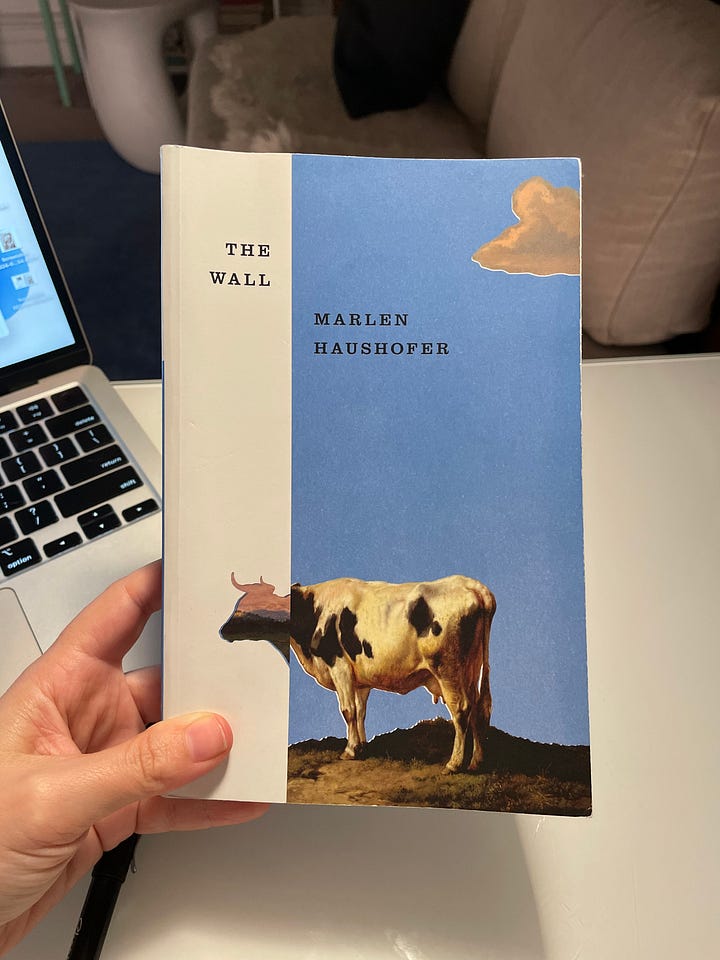
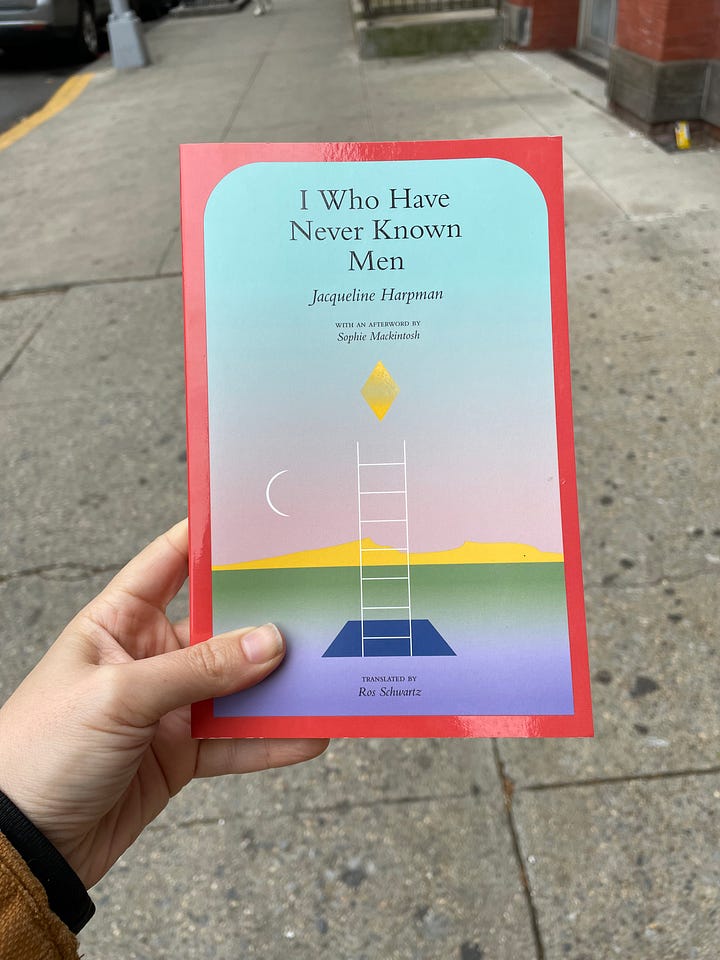
Marlen Haushofer - from Austria - released The Wall in 1963. Jacqueline Harmpan - from Belgium - released I Who Have Never Known Men in 1995. There is something comforting & dazzling about seeing these two different women tackle feminism, dystopia, tenderness, interconnectedness, & independence in different locations & languages & decades. What could be more mysterious then being social creatures intrinsically wired for connection – but living deeply internal, nuanced lives?
I love the novel form for housing such human mysteries:
I am alone, yet I am not alone...
I am a singular being, yet I cannot be unstitched from the universe at large…
I live inside the small container of my head, yet through these little eyes the container can hold the endless night sky...
My human life is unique! & important! along with the 8 billion other unique & important human lives on this planet…
Lately, I am coming to terms with my perfectionism. I am staring that truth in the face & noticing how often it does me harm while tricking me that it is protecting me. If everything really is fragile & resilient, impatient & divine, perfect & in need of work - what does it mean to take this at face value? For me, it means not just addressing that I am a recovering perfectionist, but welcoming the opportunity to become an Imperfectionist.
I love Molly Brodak’s instructions. Her poem inspired me to consider
10 Steps Toward Becoming an Imperfectionist:
Realize the cup is already broken. “‘You see this goblet?” asks Achaan Chaa, the Thai meditation master. “For me this glass is already broken. I enjoy it; I drink out of it. It holds my water admirably, sometimes even reflecting the sun in beautiful patterns. If I should tap it, it has a lovely ring to it. But when I put this glass on the shelf and the wind knocks it over or my elbow brushes it off the table and it falls to the ground and shatters, I say, ‘Of course.’ When I understand that the glass is already broken, every moment with it is precious.” – Via Mark Epstein (Thoughts Without a Thinker: Psychotherapy from a Buddhist Perspective)”
Understand that the last shirt has no pockets. “Limbs grasping to hold precious things that dissolve, like the hands of a raccoon reaching after cotton candy it tried to wash in the basin. If Loss is one constant in Life...then why do we run down the world trying to keep what we're not meant to. My father says there's a German saying: "the last shirt has no pockets." – Ana Božičević
Appreciate the unknown because:
Be a fluid process, baby. “A person is a fluid process, not a fixed and static entity; a flowing river of change, not a block of solid material; a continually changing constellation of potentialities, not a fixed quantity of traits.” — Carl Rogers
Be plural, porous. Walt Whitman said “I contain multitudes.” Poet Fady Joudah said:
Psssst. Love is better. “You can never know anyone as completely as you want. But that's okay, love is better." – Mary Oliver
Bafflement is holiness. “If you think you understand, it isn't God.” – Soren Kierkegaard
To be mortal is to belong. “I get that 'mortal' refers to being subject to death. But there's another definition I really love which is ‘belonging to this world.’" – Nadia Bolz-Weber (Thank you Linds Mueller for sharing this quote.)
Wisdom is seeing the shape.
Give love to the minor, hidden, tentative, & ephemeral. “Wabi-sabi is a kind of beauty that's imperfect, impermanent, and incomplete, says Leonard Koren in his book Wabi-Sabi for Artists, Designers, Poets and Philosophers. It differs from Western notions that beauty resides in the ‘monumental, spectacular, and enduring.’ It's about ‘the minor and the hidden, the tentative and the ephemeral: things so subtle and evanescent they are almost invisible at first glance.’" – Via Rob Brezny
With ample maple syrup,








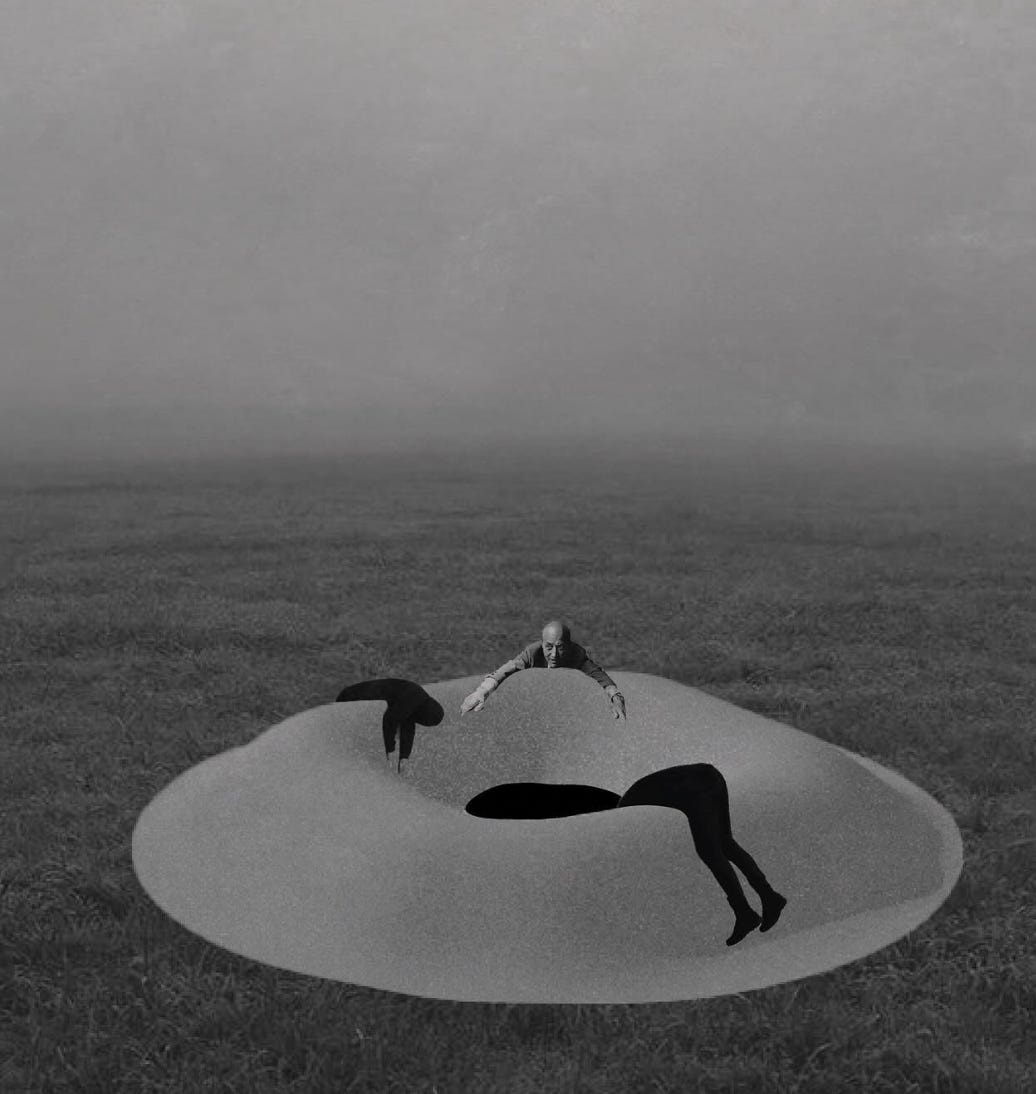
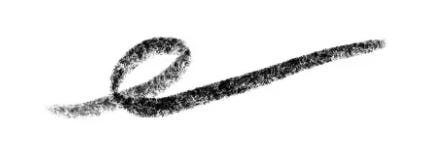
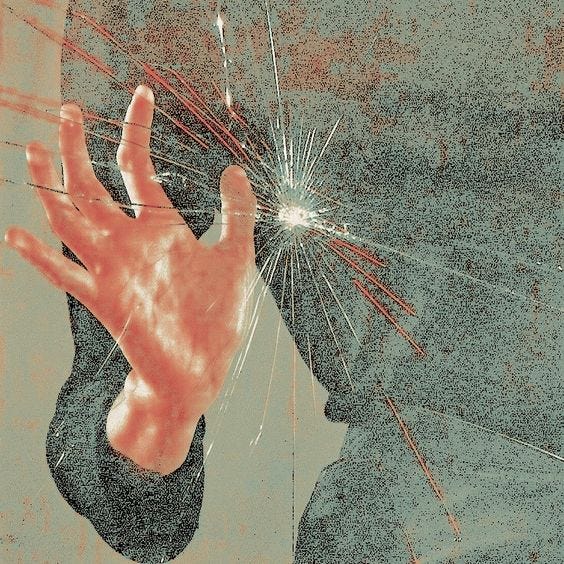
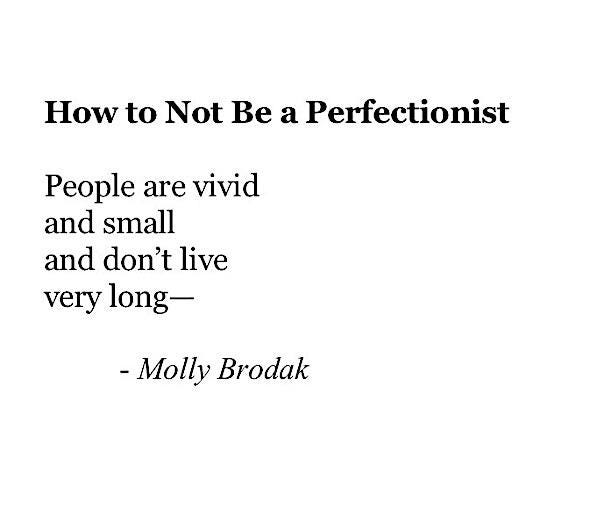





Really love your article.
The moment I realized that my perfectionism was holding me back, that I was wasting opportunities because I wanted to wait for the right time... that was my wake-up call. I was 27. Fast forward a year later, and while I'm certainly not completely going with the flow, I've been more willing to explore the unknown.
I love the connection you've made here around sitting with mystery and embracing imperfection, two things that have been heavy on my mind lately — except I'm only just now starting to make the connection. The unknown is an imperfect space to navigate, unpredictable and liminal. Moving through uncertainty, we have to release control, release knowing, release expectation in much the same way we have to do when unraveling perfectionism. Thank you for this reflection. Your words are profoundly meaningful!